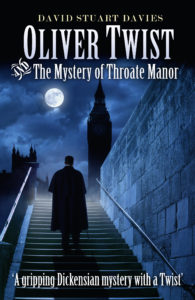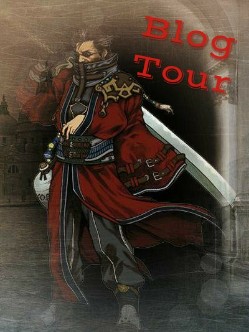

Publication Day: 14th June 2018
Publisher: Urbane Publications
ISBN: 978-1911583547
Pages: 304
Category: Fiction, Genre: Crime / Historical Thriller
A thrilling ‘Dickensian Whodunit’ in which Oliver Twist, now a young man and a lawyer, assisted by his clerk Jack Dawkins (the Artful Dodger) tries to solve a series of brutal murders.
Oliver Twist is a young man in his late twenties and employed as a solicitor. He has taken his old associate Jack Dawkins, aka the Artful Dodger, on as his clerk in attempt to civilise him and keep him out of trouble. Together they become embroiled in a dark and dangerous murder mystery.
Throate Manor is the ancestral home of the Throate Family in Surrey. The latest incumbent of the line, the aged Sir Ebenezer, trapped in a loveless marriage to Lady Amelia, is being terrified by a night visitor, a sheeted apparition who appears in his bedroom, and warns him to remember his son. This does not refer to his legitimate offspring Jeremiah Throate, a reckless gambler and libertine, who is deeply in debt to Eugene Trench, a sinister figure in the Victorian underworld. The son to whom the apparition refers is an illegitimate child Sir Ebenezer fathered with a maidservant some twenty five years previously.
Fear mixed with guilt prompts Sir Ebenezer to try and locate the son he has never known. He plans to alter his will to favour him. He contacts his solicitors, the firm of Gripewind and Biddle, for this purpose and they despatch Oliver Twist and Jack Dawkins to Throate Manor to attend to this business. Sir Ebenezer charges Oliver with the task of finding his lost son.
The task is a perilous one leading to violence and murder before shocking revelations threaten to destroy them all.
Bestselling crime author David Stuart Davies delivers a unique Victorian set mystery, reimagining some of Charles Dickens best loved characters in new and thrilling roles. Ideal for fans of Kim Newman, Mark Frost and the author’s acclaimed Luther Darke series.
Amazon UK / Amazon / Foyles / Waterstones
![]()

David Stuart Davies is an author, playwright and editor. His fiction includes six novels featuring his wartime detective Johnny Hawke, Victorian puzzle solver artist Luther Darke, and seven Sherlock Holmes novels the latest being Sherlock Holmes and the Ripper Legacy (2016). His non-fiction work includes Starring Sherlock Holmes, detailing the film career of the Baker Street sleuth. David is regarded as an authority on Sherlock Holmes and is the author of two Holmes plays, Sherlock Holmes: The Last Act and Sherlock Holmes: The Death and Life, which are available on audio CD. He has written the Afterwords for all the Collector’s Library Holmes volumes, as well as those for many of their other titles.
David has also penned three dark, gritty crime novels set in Yorkshire in the 1980s: Brothers in Blood, Innocent Blood and Blood Rites. He is a committee member of the Crime Writers Association and edits their monthly publication Red Herrings. His collection of ghost and horror stories appeared in 2015, championed by Mark Gatiss who said they were pleasingly nasty. David is General Editor of Wordsworth’s Mystery & Supernatural series and a past Fellow of the Royal Literary Fund. He has appeared at many literary festivals and the Edinburgh Fringe performing his one man presentation The Game’s Afoot: An Evening with Sherlock Holmes & Arthur Conan Doyle. He was recently made a member of The Detection Club.

Chapter One
Evening came. The sun began to slide slowly behind the darkening horizon. Thickening shadows, riding on the warm air, rolled across the green meadows of Surrey, nimbly scaling stone walls and riffling over hedges, reaching out to engulf the large isolated house that fronted the great expanse of open countryside.
This man-made intrusion on the pastoral scene was Throate Manor, the ancestral home of Sir Ebenezer Throate. The house was a strange mixture of styles. Students of architecture were
less circumspect in their description of the property, regarding it as a monstrosity with the fashion of one period clamped unceremoniously on to another without finesse or any consideration of aesthetics. The first ennobled Throate, Sir Willoughby, built the main body of the dwelling in 1067 in his own image: bluff, sturdy and somewhat ungainly. Very much the epitome of Norman ingenuity mixed with rough frugality, it stood, rounded grey stone sitting firmly on rounded grey stone; a brutish blot on the lush green countryside.
The structure was added to in the reign of Elizabeth I by Sir Percival Throate, who had sailed with Raleigh until inveterate mal de mer brought an abrupt end to his short and undistinguished naval career. He returned to Throate Manor under an embarrassed cloud
and kept sheep and cultivated his gout until the latter brought about his early demise. His lasting memorial was the creation of an ungainly wing in the Elizabethan style with high arched windows and labyrinthine draughty corridors.
The property had lain untouched by succeeding generations until the present incumbent of Throate Manor had a large orangery and a third wing built in the popular Gothic mode. The house was a monument to the longevity, eccentricity and lack of taste of the British aristocracy. It was also was exceedingly cold. One could pass from one end of the property to the other and journey through seven hundred years of English history while catching a severe chill
into the bargain.
As the sun slipped even further behind the far horizon, Sir Ebenezer was ensconced in the orangery with his first brandy and soda of the evening and a book of dubious content resting on his lap. As the last rays of amber sunlight squeezed their way through the palm fronds, tigering the walls of the orangery, Sir Ebenezer grew uneasy, the lines on his ancient features deepened with worry. The onset of night, that dark uncertain segment of our twenty four hour
day which cloaks so much from the eye of man and when, it is said, evil things walk abroad, caused the baronet much consternation.
As though it would physically ward off the coming darkness, Sir Ebenezer drained his brandy in one erratic gulp and then with some effort clambered to his feet, allowing the book to slide to the floor with a loud thump – a noise that caused him further unease. In the manner of a somnambulist, Sir Ebenezer made his way to the great hall. He was seeking company – the solace and safety of being with another human being as night began to ambush the land. In preference, he would have liked to encounter his secretary, Roger Lightwood. His ready smile, kind features and warm brown eyes, which still sparkled with the unsullied enthusiasm of youth, would have brought comfort to the curmudgeonly baronet, would have helped to ward off the tendrils of creeping fear that were slowly entwining themselves around his tremulous soul with every darkening moment. Sir Ebenezer would have found great comfort in the company of Roger Lightwood, but the young man had taken a brief leave of absence to spend some days at the coast where he hoped the unfettered sea air would blow away a persistent cold which had been brought on by the severe draughts generated by Throate Manor even in the summer time. Sir Ebenezer’s second choice for company, a poor second choice, he had to admit, was Bulstrode, his man servant, a fellow of few words but always a felt presence.
However, as it happened, on reaching the hall, Amelia Throate, Sir Ebenezer’s wife and constant irritation, was the first person he encountered as she descended the staircase in a high stately manner as though she were attending her own coronation. As these two individuals glanced at each other with practised disdain, their memory did not for one instant take them back to their youth – to one of those idyllic moments when they were both lithe of body, smooth of skin, and nimble of mind. A time before age, illness and over familiarity had not deformed their once bright natures. Amelia had completely forgotten the occasion when a tall willowy fellow, with attractively unruly hair cascading around his forehead like blonde watch springs and the possessor of a broad captivating smile had punted her down the river, serenading her with songs of romance and exotic climes. Oh, how her young heart had fluttered when he bent low to kiss her chastely on the cheek. Such memories had long been exorcised. They had seeped from her mind like sand through an hour glass. Her thoughts of Sir Ebenezer were now prompted solely by what she saw before her: a fat, bald fellow whose several chins resembled a pile of biscuits which overflowed his collar and whose rheumy eyes and stained teeth suggested an apparition that had been released from a gluttonous netherworld. A creature to whom she was shackled by the insidious chain of marriage vows until death.
In a similar fashion, Sir Ebenezer never recollected the occasion of Lady Dartmouth’s ball in the spring so many yesterdays ago when he spied a magnificent girl by the punch bowl in conversation with a young soldier. Her shining hair shimmered like a chestnut halo in the muted candlelight; her smooth pink cheeks dimpled delightfully as she smiled and her bright blue intelligent eyes flashed with enthusiasm as she expressed a point with fervour. It was on
that magical moment of first seeing her that he had determined to
meet the girl, woo her and marry her. He now had no recollection
of the evening nor the young beauty who stole his heart, despite the
fact that her older self now faced him and her blue eyes, although
dimmed a little now by the passing years, still held the fierce spark
of intelligence.
Sir Ebenezer and Lady Amelia were now intolerant strangers isolated upon the tiny barren desert island of their marriage, forever castaways with no hope of rescue.
‘Oh, it’s you,’ observed Sir Ebenezer with a charmless warble.
‘Yes, it is I,’ replied Lady Amelia, making no effort to disguise
the sneer and sarcasm in her voice. ‘You were perhaps expecting
someone else?’
Sir Ebenezer shivered with genuine fear at the suggestion. Without further converse, they made their way to the dining room, a great draughty chamber where a meagre log fire struggled to keep itself alight, its puny yellow limbs stretching upwards towards the sooty maw of the chimney but as these feeble flames lacked the power to remain dancing above the thick damp logs they sank down out of sight before they could make their presence felt. Two candelabrum placed at either end of the long dining table provided the main source of illumination. Like a visiting spirit from the afterlife, Bulstrode emerged from the shadows, where he had been disguising himself as a piece of darkness, to draw Lady Throate’s chair from the table in order for her to be seated. Once this task had been completed, he moved swiftly as though on castors to the other end of the table where Sir Ebenezer was waiting for the same operation to be performed for him. It was a nightly ritual as was everything about the meal. Master and mistress sat at either end of the long table, hardly able to discern each other’s face let alone indulge in any conversation. Indeed, conversation had not been practised in the house for many years. Brief utterances and wry observations were all that could be managed now. There was a time coming, they both realised, when even those would dry up and they would become mime artists in their own home.
Soup was the first course. Soup was always the first course. Sir Ebenezer took one spoonful as usual, grunted slightly and laid the spoon aside before taking a gulp of red wine. Lady Amelia took an infuriatingly long time to sip, sip, sip, sip, sip, sip and sip the soup. Sir Ebenezer filled in the interval by downing two more glasses of wine. For a moment he gazed sideways towards the high windows and saw that the sky was now a thick indigo broken only by the appearance of a thin slice of pale yellow moon surrounded by a sprinkling of a few timid stars.
Night was here and with it the arrival of his terrors. As though to acknowledge the fact, he gestured to Bulstrode to replenish his glass yet again. Tonight the main course was lamb. Sir Ebenezer dropped one slice into his mouth whole, the thin gravy dribbling down his chin. He sneered at the potatoes, grimaced at the vegetables and lifted his glass once more.
Lady Amelia sliced the meat thinly and then conveyed numerous dainty portions to her mouth, which she nibbled and chewed and chomped and then nibbled and chewed and chomped once more before swallowing. She repeated the process with the potatoes and
then with the vegetables. Sir Ebenezer began to doze while this tedious ritual of mastication was performed. A sharp crack emanating from the fire brought him fully back into consciousness and once more the icy hand of fear touched him gently but irresolutely on the shoulder. With a gesture grown large with nerves and alcohol he beckoned Bulstrode to refill his glass once more which he then proceeded to empty again without pause.
Once Lizzie Barnes, the housekeeper and cook, had cleared the dinner plates, there was a ten minute interval before the pudding was served. During this period neither diner felt the least inclination to acknowledge the other. That mechanism, in any form, had failed years ago, the little cogs of spontaneity were jammed and the great wheels of thought had rusted completely. Instead, each lost themselves in their own private contemplations. Lady Amelia was thinking it was time she made a trip to Town to indulge in some shopping and visit the theatre. In other words, to experience a little life.
Sir Ebenezer’s thoughts were less pleasurable. He was conscious that soon he would have to retire to his bedchamber and face the night terrors again. He had already contemplated the possibility that he was going mad. Eccentricity rather than madness was a family trait but perhaps he was the first of his breed to step across the line from idiosyncrasy into lunacy. His stomach churned at the thought of it. Because all forms of intimacy between he and his wife had long ceased, he had not confided in her what he feared or what he had seen.
He was alone in his bewildered misery. Pudding arrived. Sir Ebenezer ignored it. He never had a liking for sweet things and now the alcohol had shrivelled his taste buds so that they only appreciated … alcohol. Therefore while Lady Amelia dallied with the apple pudding, sucking, chomping and grinding, Sir Ebenezer sent Bulstrode off the cellars for a decent brandy.
Because this was a nightly request, Bulstrode was sharp and seasoned enough to have a bottle already stowed, like Polonius, behind the arras and returned with remarkable speed with the cobwebby bottle. And so the evening and indeed the whole tedious dining experience of this time-ravaged couple drew to a close. The passing years, disillusion, fate, infirmity and a whole collection of unidentifiable elements had wrought such a change on Ebenezer and Amelia who, once upon a time had been lovers and life partners who would have laid down their life for the other. Now they were mechanical shadows bonded by a religious ceremony they had indulged in with enthusiasm nearly forty years ago. How those mischievous cupids floating on the clouds on high must be filled with merriment at this gloomy consequence.
* * *
Sir Ebenezer entered his bedchamber some time later. His brain and perceptions were suitably softened by drink, but not enough to make him forget the possible peril that might befall him. In a lumbering, arthritic fashion he began to disrobe, stopping every now and then to stare at the shadows on the wall created by the flickering candles on his bedside table. They danced and assumed shapes that he did not like. He drew the curtain sealing out the night, the moon and the stars. Pulling on his long woolly nightcap until it came down to his eyebrows, he approached the monster four poster bed. It was, his slightly befuddled mind acknowledged, the bed in which, almost certainly, he would die, as had his father and his father’s father and his father’s father’s father. It was the family death bed. This insidious thought sobered the old baronet up somewhat for it carried with it the supplementary notion that this may well be the night when that fateful event took place. The night when he was frightened to death.


